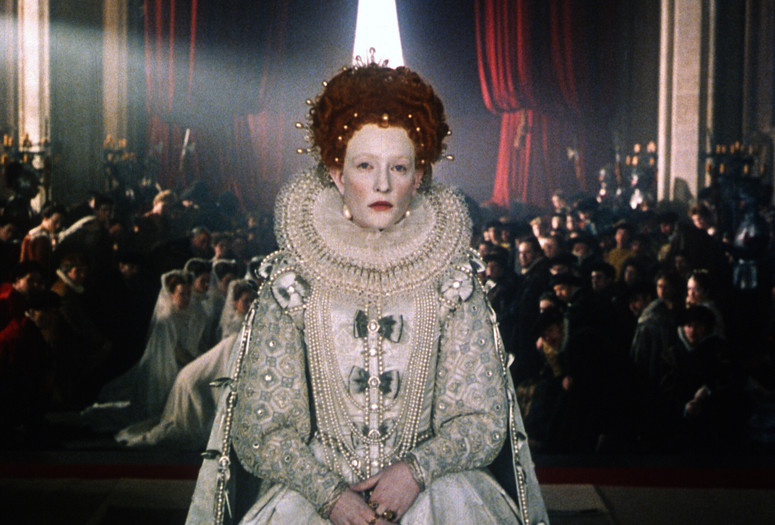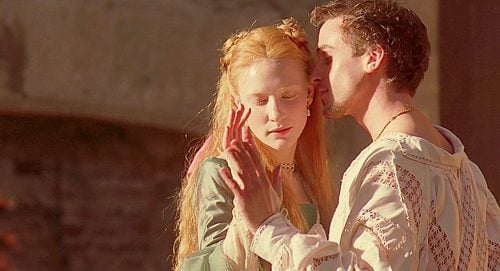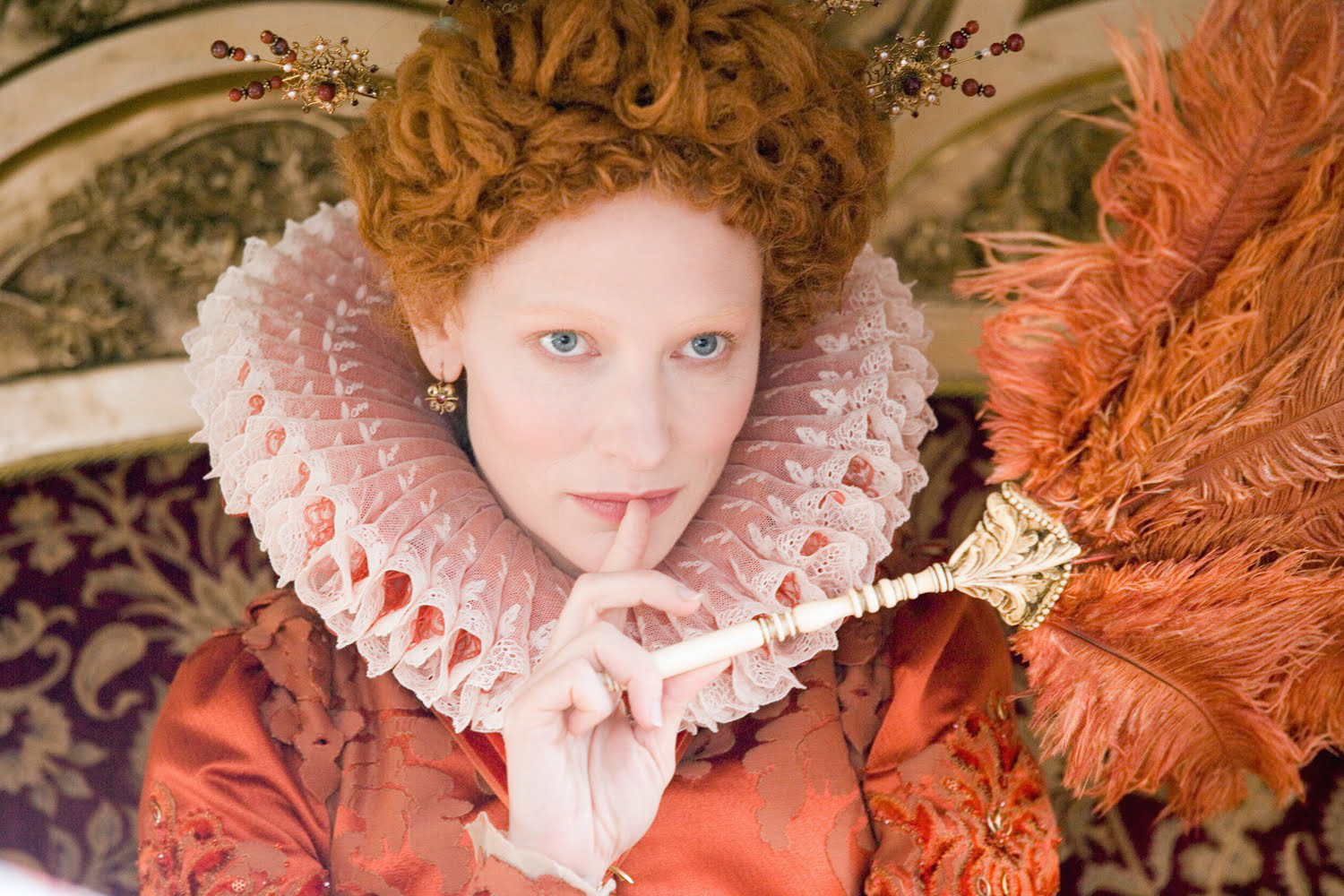Elizabeth (1998)

DIRECTOR: Shekhar Kapur
CAST: Cate Blanchett, Geoffrey Rush, Joseph Fiennes, Richard Attenborough, Christopher Eccleston
REVIEW:
The reign of Queen Elizabeth I of England began in 1558, when at the age of twenty-five, she succeeded her half-sister Mary I. Over the course of the next forty-five years, she ushered in the so-called Golden Age and became one of the longest-reigning and most popular and successful monarchs ever to sit on the British throne. Director Shekhar Kapur’s lavish period costume drama Elizabeth, however, focuses on the early years of Elizabeth’s reign, when the young queen was surrounded by enemies and plagued with uncertainty, and facing the prospect of losing her throne—and her life—so soon after taking it.
When we open in 1554, the cancer-stricken Queen Mary I (Kathy Burke), daughter of Henry VIII, sits on the English throne. Paranoid that her younger half-sister Elizabeth (Cate Blanchett) is plotting to usurp her, she has her thrown into the Tower of London, but Elizabeth survives and assumes the throne upon Mary’s death. But even after going from prisoner to queen, Elizabeth’s situation is still precarious. She inherits a mess of problems: a weak and ill-prepared army, a dry treasury, a religiously-divided nation, and heavy pressure from her advisers to marry, produce an heir, and secure her bloodline. And she has many enemies, both foreign and domestic. Because Elizabeth is a Protestant, Pope Pius V (John Gielgud) issues a proclamation declaring her a heretic and releasing all English Catholics from loyalty to her, turning every Catholic in the country into a potential enemy. The French queen Mary of Guise (Fanny Ardant) is amassing troops against her. And there is a conspiracy to overthrow her among the nobles in her own court, led by the Duke of Norfolk (Christopher Eccleston). But Elizabeth also has three allies in her corner: her chief adviser William Cecil (Richard Attenborough), her cunning and ruthless spymaster Francis Walsingham (Geoffrey Rush), and her lover Robert Dudley (Joseph Fiennes).

While viewers uninterested in these kinds of historical costume dramas about British royalty may not be converted, Elizabeth is not a stodgy, stuffy affair. Rather, it is an engrossing drama against the backdrop of convoluted and labyrinthine European politics and court intrigues where the stakes are literally life and death, where sex and marriage and power are all intertwined, and there’s no prizes for coming in second (one can see where Game of Thrones took inspiration from the true stories of real rulers like Elizabeth and the worlds they lived in). It’s also not overly romanticized or Hollywoodized; there’s not much conventional “action”—we see only the aftermath of a battle—except for moves and countermoves by various factions who hatch intrigues in the shadows, and while Elizabeth lives in luxury, at least compared to the average person, the castles the characters inhabit are dark and dimly-lit by torchlight and give off a grim, chilly air. At the same time, we get some magnificent settings—the recreation of Elizabeth’s coronation in the massive Westminster Abbey—and costumes are colorful and sumptuous. There are visually striking sequences, such as a festival aboard ornately-decorated boats while fireworks burst overhead, and a lively court dance. The climax, as Elizabeth and Walsingham wipe out their enemies and solidify her power, recalls, of all things, the climax of The Godfather, right down to the main character at prayer while assassinations are carried out in their name.
Additionally, despite being a queen, Elizabeth still counts as an underdog success story, and that vulnerability helps make her a compelling protagonist whom we’re able to be concerned for and root for. She takes the throne early in the movie, but she has to survive the ominous Tower of London and an unsigned death warrant hanging over her head to get there, and even then she’s out on thin ice and two assassination attempts—one with an arrow, one more subtly and creatively with a poisoned dress sent as a deadly gift—proves she’s far from untouchable. Elizabeth’s reign gets off to a rocky start, and her grasp of power is on shaky ground. She is not taken seriously by the bishops who regard her as a heretic, and is treated by them and the Duke of Norfolk with thinly-veiled scorn. Inexperienced with military matters, and browbeaten by Norfolk at a military conference, she presides over a catastrophe when she hurls ill-trained boys into a disastrous military campaign into Scotland. Her calls for religious uniformity are met by a jeering crowd above whom she struggles to make herself heard. She is surrounded by enemies within and without and it seems she might not survive long (though of course, we know from history that she ultimately perseveres). Her foes are many and varied: the Duke of Norfolk and his allies within her own court, Mary of Guise and her superior army, a scheming Spanish ambassador (James Frain), and the Vatican itself. The movie has been accused of being anti-Catholic, and certainly it is unflattering to the Vatican; we open with Protestant “heretics” being burned at the stake, and later Pope Pius V drafts a letter explicitly condoning Elizabeth’s assassination and dispatches an emissary (Daniel Craig) to rendezvous with the conspirators. To survive in this viper’s nest, Elizabeth must learn some hard lessons about what it means to rule, including embracing actions she initially has little stomach for, and learning to rule with her head instead of her heart. Her love affair with Dudley causes problems for her pragmatic advisers who urge her to consider various politically-motivated marriages to forge alliances and solidify her reign, something her infatuation with Dudley makes her reluctant to do. In turn, her grudging consideration of suitors poisons their initially heady affair, and Dudley’s jealousy steers him into ill-considered actions. “I am no man’s Elizabeth!” she defiantly declares at one point, and indeed she came to be known as “The Virgin Queen”—likely a fiction manufactured by Elizabeth herself—because in her whole forty-five year reign, she never married and in the process became one of the few female monarchs of her time to rule singlehandedly in her own right without an alliance of marriage with a man.
While faithful in the broad strokes to the historical record, sticklers for historical accuracy will take issue with the ways in which Elizabeth takes some liberties and dramatic license. The timeline is fudged and condensed, with various pivotal events of Elizabeth’s long reign squeezed into a few year period. Mary of Guise and Álvaro de la Quadra died of natural causes and not the assassinations the movie depicts. Additionally, it remains forever shrouded in ambiguity and mystery whether or not Elizabeth’s love affair with Robert Dudley was physically consummated, while the movie explicitly portrays a sexual relationship between them. More problematic in regards to Dudley is the way the movie implicates him in the plot to dethrone Elizabeth; in fact, although their relationship was turbulent and may have eventually cooled, they remained close until his death (Elizabeth and Dudley’s relationship is given more focus and portrayed more historically accurately in the 2005 BBC television miniseries The Virgin Queen, starring Anne-Marie Duff as Elizabeth and Tom Hardy as Dudley). Ultimately, however, while some of its dramatic license might rankle historians, none of this will be of much consequence to mainstream moviegoers, and none of it interferes with Elizabeth‘s effectiveness as a compelling and involving drama.

The greatest strength holding all of Elizabeth together is the central performance by Cate Blanchett, who brings a historical icon known only through portraits fully to life as a flesh-and-blood three-dimensional character. Not only does Blanchett look the part, especially when she eventually dons the iconic hairstyle and white makeup, but more importantly she captures every aspect of Elizabeth’s personality as a fiery, determined woman in a precarious position: her early innocence and naiveté, her uncertainty and her sharpening political instincts, her willfulness and sometimes recklessness, and her gradually learning the bittersweet lesson to lock her vulnerability away behind an icy and aloof facade. Elizabeth is worth rooting for as a protagonist because she is headstrong and inexperienced but smart and a fast learner, because she refuses to be reliant on a man, and because by the end she has outmaneuvered all of her many enemies and also spurned out-of-touch and condescending male advisers to follow her own instincts. Blanchett is equally convincing as the carefree and heedless young woman she begins as, and the imperious and regal queen, and her range makes Elizabeth work.
She’s backed up by a solid supporting cast. Geoffrey Rush (seen earlier this year as Inspector Javert in Bille August’s Les Miserables) plays her spymaster Walsingham as a shrewd, sly, sinister figure who lurks in the shadowy corners of rooms, yet when he needs to can be charismatic, even seductive (his introduction, where he talks his way out of a dagger at his throat, and his dinner scene with Mary of Guise), the kind of deliciously Machiavellian character who can be a valuable ally but whom you wouldn’t want as an enemy. Richard Attenborough is the elderly William Cecil, who advises Elizabeth as best he knows how but might be out of touch and past his prime (he gets a poignant moment when he realizes he is being sent into retirement). Christopher Eccleston exudes a cold arrogance as the primary “villain” the Duke of Norfolk. If there’s a marginal lightweight in the primary cast, it’s Joseph Fiennes, who is neither as strong of an actor nor as forceful of a screen presence as his brother Ralph, although he has enough chemistry with Blanchett to sell the sexual tension between Elizabeth and Dudley. The rest of the ensemble includes a batch of character actors doing sterling jobs in smaller but key roles, including Kathy Burke in a short opening appearance as Elizabeth’s half-sister Queen Mary I, French actress Fanny Ardant as Mary of Guise, Vincent Cassel stealing a couple of scenes in a colorful bit part as the flamboyant (and cross-dressing) Duke of Anjou, Emily Mortimer as Elizabeth’s chief attendant, Daniel Craig as a Catholic priest involved in the anti-Elizabeth conspiracy, James Frain as a slippery Spanish ambassador, Edward Hardwicke as the Earl of Arundel (in a role not dissimilar to the Puritan elder he played in 1995’s The Scarlet Letter), and John Gielgud in a cameo as Pope Pius V.
Some of Elizabeth‘s multi-factional intrigues threaten to be a little overly convoluted and confusing, and some of its historical inaccuracies (most egregiously its semi-vilification of Robert Dudley) rankle. None of its minor flaws or controversial elements, however, hold back its effectiveness as a fine historical epic and lavish costume drama which contains enough adventure, intrigue, and romance to keep the proceedings from dragging. Those who lack interest in these kinds of British historical costume dramas might not be converted, but Elizabeth is well worth watching for those with an interest in the subject matter.
* * *